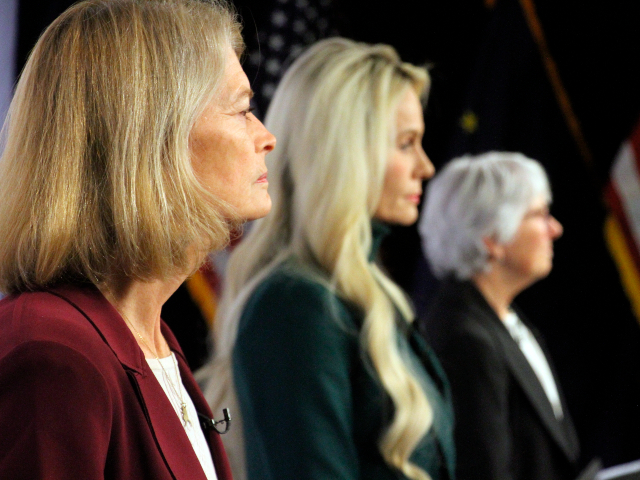Twenty-one year incumbent Sen. Lisa Murkowski (R-AK) and Republican challenger Kelly Tshibaka advanced on Wednesday to the final found of ranked-choice tabulation after neither candidate reached the 50 percent threshold in the first round.
With 80 percent of the votes counted, Tshibaka leads the race with 44.3 percent. Murkowski is close behind at 42.8 percent, while Democrat candidate Pat Chesbro holds 9.5 percent.
The vote counting will now move into a late stage of tabulation, where the third choices of down-ballot votes are distributed across the remaining candidates to see if either one of them will reach the 50 percent threshold.
The final vote tabulation could take up to 15 days after Election Day.
Alaska’s elections use a ranked choice voting system effectively affords Democrat voters the opportunity to vote for Murkowski on the second and third ballots. Alaska’s ranked-choice general election and open primary system works like this:
All candidates from all parties appear on the ballot together in the August primary. The top four vote-getters regardless of party then advance to the general election, and their voters are given the opportunity to pick their top choice, as well as their second and third choices. If no candidate in the first round of voters’ first choices gets 50 percent of the vote, the last place candidate’s second choices are distributed across the remaining three candidates to see if someone can get across the majority threshold. If that fails again to produce a majority vote-getter, then a third round is conducted where the third place candidate’s votes are redistributed according to second choices between the remaining two candidates.
The voting system was instituted in 2020. A recent video exposed a Murkowski aide who said the ballot initiative to decide whether to institute ranked choice voting in Alaska was backed by people who “wanted Lisa to get reelected.”

Sen. Lisa Murkowski, left, a Republican, looks on Thursday, Oct. 27, 2022, prior to a U.S. Senate debate in Anchorage, Alaska. She faces Republican Kelly Tshibaka, center, and Democrat Pat Chesbro, right, in the general election. (AP Photo/Mark Thiessen)
It appears Murkowski could win the election due to ranked choice voting even though she was outvoted in the first round. Before the election, Murkowski allied herself with Democrat Chesbro, who in turn said she was voting for Murkowski in an effort to gain support down ballot against Tshibaka.
Throughout the race, Murkowski was aided with $9 million from the Mitch McConnell-backed super PAC. The fund backed Murkowski even as it pulled funds in from New Hampshire Senate Republican challenger Gen. Don Bolduc and Arizona Senate Republican candidate Blake Masters.
According to Open Secrets. Murkowski outspent Tshibaka by about $4.5 million. Polling showed the race as a tossup with Tshibaka leading by a slim margin.
Follow Wendell Husebø on Twitter @WendellHusebø. He is the author of Politics of Slave Morality.

COMMENTS
Please let us know if you're having issues with commenting.